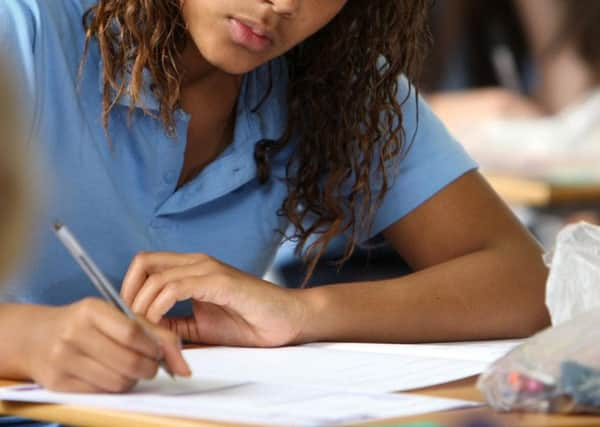Region’s schools get better marks to buck national trend


The level of 16-year-old pupils achieving at least five Cs, including English and maths, rose from 57.3 per cent in 2012 to 59.1 per cent. This was the biggest improvement in results outside London and moved Yorkshire above the North East and East Midlands in a regional league table.
This nevertheless means that more than 23,000 pupils across the region finished their year 11 without reaching the key Government benchmark.
Advertisement
Hide AdAdvertisement
Hide AdNationally, 58.6 per cent of pupils in England reached the threshold, down 0.8 per cent on last year, according to statistics published yesterday by the Department for Education (DfE).
Statisticians suggested that the fall was down to a dramatic drop in the proportion of private school pupils sitting GCSE English.
Less than two thirds took the qualification this summer, compared with 92 per cent in 2012.
In state schools alone, there was a rise, with 60.2 per cent gaining five or more A* to C grades, including the basics, up 1.4 per cent on last year, the figures show.
Advertisement
Hide AdAdvertisement
Hide AdMost of the 15 education authority areas in Yorkshire have seen schools achieve their best ever GCSE grades, the tables, based on provisional exam results, show.
York was the region’s best performer with 67 per cent of pupils achieving the five A* to C benchmark.
It was followed by Wakefield where 65.9 per cent made the grade – a big increase on last summer’s 59.3 per cent.
Barnsley achieved a significant milestone as more than half of its pupils achieved five good GCSE results, including English and maths, for the first time.
Advertisement
Hide AdAdvertisement
Hide AdThis left only Hull as an education area where a majority of the students failed to achieve similar results.
However, the city’s schools only just missed out with 49.6 per cent of pupils achieving the benchmark – Hull’s best ever results.
Leeds City Council’s executive member for children’s services Councillor Judith Blake praised pupils in the city for delivering its best ever GCSE results, with 56.6 per cent of pupils making the grade, against the backdrop of last year’s exam row which she said had shaken many people’s confidence in the system.
GCSE results in 2012 were overshadowed by a marking row which led to a national legal challenge involving most of the councils in Yorkshire along with some schools and pupils.
Advertisement
Hide AdAdvertisement
Hide AdThe failed bid to get GCSE English work remarked was launched against the exam boards AQA and EdExcel, after it emerged that grade boundaries had been moved mid-year between January and June meaning the same standard of work could receive different grades depending on when it was marked.
The latest national statistics also show a rise in the number of children taking the Government’s English Baccalaureate subjects.
The EBacc used in league tables is awarded to pupils who achieve at least a C at GCSE in English, maths, two sciences, history or geography and a foreign language. More than a third (35.4 per cent) of state school pupils entered for the EBacc this year – up from just under a quarter (23.1 per cent) last year.
Education Minister Elizabeth Truss said: “We have reversed the long-term decline of the key academic subjects that give children the best chance to get on in life.
“For years children were steered away from subjects like languages and history but the EBacc is fixing that.”